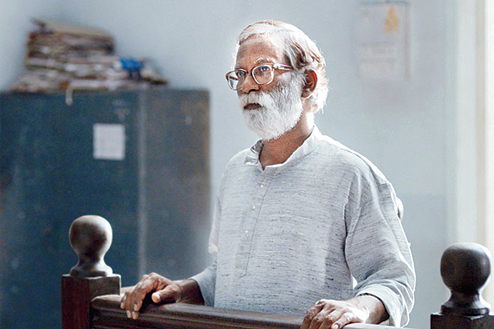
COURT (U/A)
Director: Chaitanya Tamhane
Cast: Vivek Gomber, Geetanjali Kulkarni, Vira Sathidar, Pradeep Joshi
Running time: 116 minutes
Chaitanya Tamhane’s Court is almost an Aesop’s fable. A fable we have all heard of and some of us have been unfortunate enough to experience first-hand. Experience the slow death called the Indian judicial system.
The premise sounds too outlandish to be a true story. A poet is arrested for abetment of suicide because a manhole worker supposedly killed himself in the gutter after hearing him sing a song in the neighbourhood. He is taken to the sessions court where date after date after date is allotted to connect the death and the singing. And date after date after date you are witness to the great Indian tragi-comedy show!
The players make the show. There’s the 65-year-old accused, Narayan Kamble (Vira Sathidar), a Dalit activist-poet who teaches kids and takes singing workshops. The songs written by him talk about the dreary times we live in, about finding dignity in the dungeon, about demanding that dignity. He is unfazed by the laws that stop him from rousing public sentiment.
There’s Vinay Vora (Vivek Gomber), the human rights activist and lawyer representing Kamble. He drinks expensive wine and listens to jazz but when not lapping in luxury, he wants to make a difference. Against him and representing the state is public prosecutor Nutan (Geetanjali Kulkarni) who doesn’t attach her moralities to the court case and looks at it as a 9-to-5 job.
And finally there’s the judge (Pradeep Joshi) who we are told is the fastest one, hearing five cases a day. He doesn’t want to delay the case on purpose but is so bound by the laws that all he can offer is a new date. In the end we get a glimpse of his personal life and are left guessing what kind of an impact that has on his judgments.
No one’s at fault here. Except the system itself, which still goes by archaic laws. In fact, the Dramatic Performance Act, which drags Kamble to court, is a Victorian Law of 1876. And every time there’s a missing witness or some innocuous new finding to investigate, you are served taareekh pe taareekh, taareekh pe taareekh.
Almost mirroring the lackadaisical approach of the judiciary system is the unhurried pace of the film, which will struggle to engage the usual mainstream movie watcher. Also, it is not a classical cause-effect, conflict-resolution narrative and will surely challenge viewers looking for a regular dose of entertainment.
Perhaps the greatest achievement of Court is its ability to create a world beyond the film’s diegesis. In its representation of space through its shot-taking, its pacing and the quasi-documentary style, the film’s frames become entirely centrifugal. They are mere windows to a bigger picture where not just Narayan Kamble’s, but millions and millions of Indian court cases stare at us in their helplessness.
Court doesn’t offer you a rich cinematic experience or flaunt breathtaking performances or deliver stomach-churning twists. Its sole objective is to uncover the wretched circus that is the Indian judiciary system. And that makes it a far more important piece of motion picture than anything up there on the big screen in quite some time. Calcuttans have a very tiny window but don’t miss your date at Court.
Pratim D. Gupta
Marathi (with English subtitles), playing at PVR (Jessore Road) 6.50pm and Cinemax (Mani Square) 3.15pm










